Gene · October 8, 2011 at 11:12 pm
We are now in the 3rd week of the CSM Examination Nightmarathon™, but don’t despair. The friendly CSMAC Senior Staff has more anime to cram into your brain, which incidentally forces out most of the information you’re about to be tested on. Read the fine print, people!
[C] 5 – 6
After seeing some of the more eccentric Deals involving the Starling Guild, we see Mikuni and Kimimaro at Guild Headquarters.
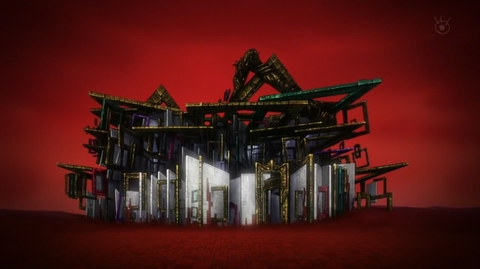
It's like the dream house of M.C. Esher and Adam Smith.
Here, Kimimaro is told that the best way to minimize the effect of Deals on reality is to win by as small of margins as possible. This is accomplished by analyzing and refining your skills down to a science: basically being an engineer. Of course, this is a process of trial and error, so Kimimaro suffers his first loss. He immediately checks on everyone and everything in his life, only to find that his worst problem is him failing one of his Econ courses.
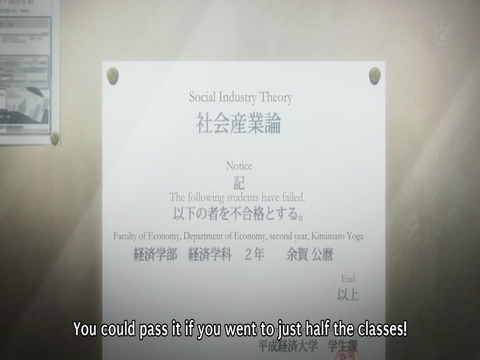
Seriously, failing Econ takes true talent.
Later, the various Starling Guild members gather to watch a Deal between two super-wealthy non-Guild Entrés. It is during this battle that something really unsettling occurs: both Entrés lose money at the same time, but the money doesn’t simply transfer between one another like in other Deals. The money is just GONE, and this result translates directly into reality, throwing the future of a major pharmaceutical company into question.
Kimimaro asks Mr. Ebara what the effects would be of a major company like that collapsing, and the news is obviously bleak: tens of thousands of lives altered, as well as years of medical equipment and innovations lost. And just how has Ebara been doing after going Bankrupt in the District? It turns out his wife left him, and he’s been slowing losing his sanity while trying to separate the details of the reality he once knew and the current one.
Meanwhile, Sato notes the Japanese birth rate and resources decline, while crime and poverty are on the rise. She and her scattered compatriots believe that these trends are directly caused by Deals in the Financial District.
Later, we see Kimimaro and MYSU working out the details of their next Deal.
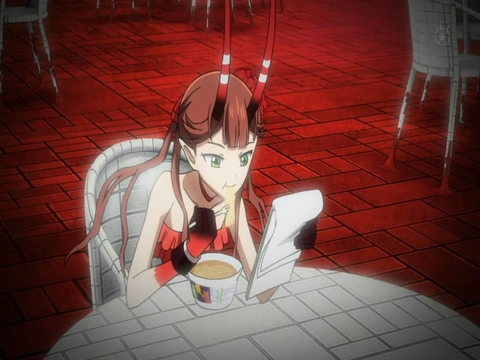
CSM Undergrad - 3:00 AM on a Thursday
During which, the ever-interesting Info Broker pops in to tell (and by that, I mean sell) Kimimaro news that the pharmaceutical company in jeopardy has just been bought by another pharmaceutical managed by (you guessed it) Mikuni Soichirou. In fact, it turns out he’s been buying up Japanese bonds in order to stabilize the national economy enough to spur long-term growth, all while the government sinks deeper into debt. As such, it’s all in the name of minimizing the impact on the Present.
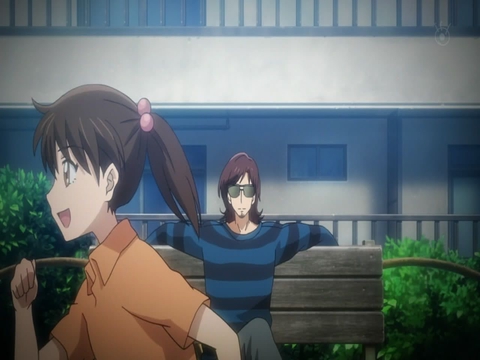
Sitting on a park bench, eying little girls with bad intent.
At this point, it becomes painfully apparent that the Financial District and the real world are inextricably linked. Our reality has become so dependent upon the Midas Money that the real world would collapse if the flow were to stop. As such, Mikuni has decided that coexistence is the only viable option, but Kimimaro still harbors doubts.
Episode 6 introduces another super-wealthy Entré named Sennouza Kou, a young man who devotes his life to charity work and is currently worth 9.87 Billion Yen.
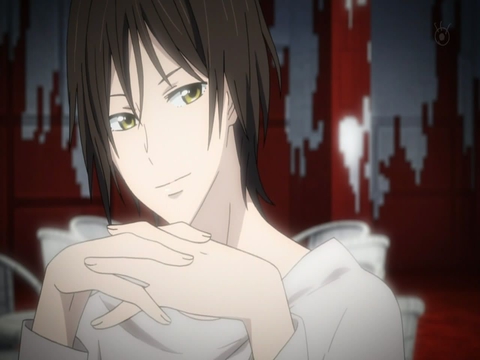
But he can’t save Japan without Juiz and his trusty cell phone.
Since he is Kimimaro’s next opponent, Kou stops by to offer him a way out of competing. The Financial District has one way for an Entré to pass on a Deal: deposit half of their total Assets into the Bank. Since reality would suffer if Kou did that himself, Kou instead offers to pay for his opponents to pass. His reasoning is that the Deals will always have a detrimental effect on reality, so it is the responsibility of the rich to prevent others from making Deals at all. Unfortunately, Kimimaro may have been focusing on Kou’s demeanor more than his message.
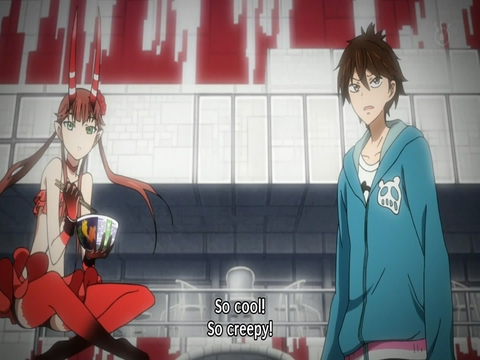
The same thing happens to couples who watch Twilight.
Later, Kimimaro is finally contacted by Sato, who presents her case while eating a stack of sandwiches. She questions if Mikuni can really minimize the effects of the Financial District if he is actively investing huge sums of Midas Money to maintain the current Japanese economy. Sato believes that Kimimaro has not been consumed by money and therefore has a chance to affect meaningful change in the District.
Kimimaro then meets with Kou to hear his world view. Kou also understands the large-scale negative results of Midas Money. He shows Kimimaro a room filled with drawings sent by children from the countries that his charity organizations work in. The drawings’ only unifying trait is a vision of the future. In the 57 Deals that Kou has participated in, he has only lost once. However, by doing so, some of the drawings were erased, and the futures of those children along with them.
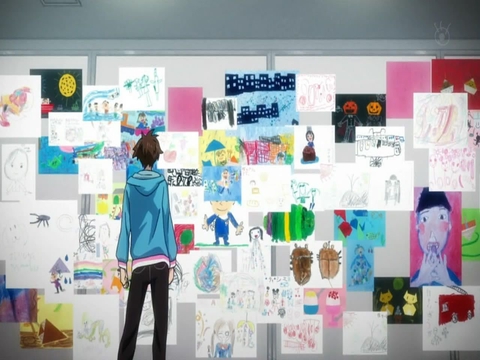
Kou is apparently as creepy as he is rich.
Of course, we later see yet another talk between Mikuni and Kimimaro.
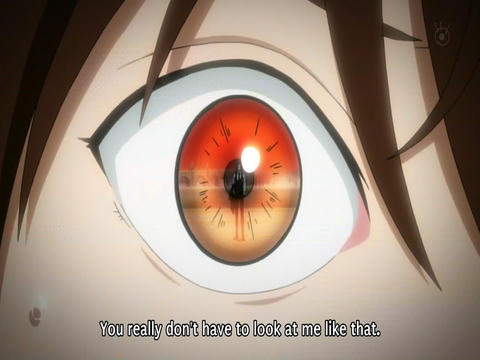
Gene often has that look when we talk about Club operations.
It turns out that Mikuni dealt Kou his only loss, citing that although they are both on the same path, Kou’s view is a limitation. Mikuni believes that the Future is merely a continuation of the Present, and that there can be no Future without a Present. On the other hand, Kou believes that there is no point in the Present if there is no Future. Such logic angers Mikuni, who calls it “the logic of the powerful and far-sighted,” while the truly weak struggle every day to maintain their reality.
Mikuni says that there is a “stench of the blood on the money,” that everywhere you use money, there is always blood flowing nearby. Q, who is often seen eating Midas Money, says that the Money has no smell, but it has a variety of flavors. This is an important foreshadowing, so I’ll just leave it here for later reference.
In the end, Kimimaro decides to fight Kou, which is obviously a poor decision.
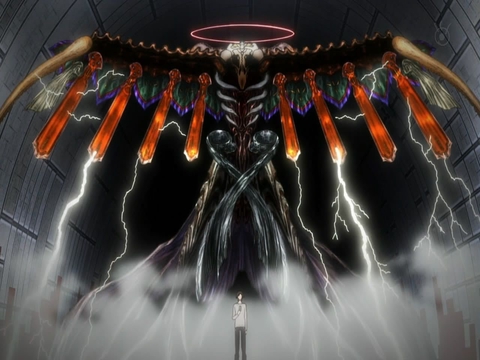
Behold the Angel of Death.
Now, despite Kou’s insane power, Kimimaro decides that he has to win just so that he doesn’t lose that which is still important to him. It sounds like it’s going to be a pretty badass fight, and it probably WAS. Unfortunately, Kou’s Asset hogged all of this episode’s budget, so we get an immediate cut-scene to the epilogue of the episode. Hell must have somehow frozen over because Kimimaro apparently defeated AND BANKRUPTED Kuo in an epic fight that we’ll never see.
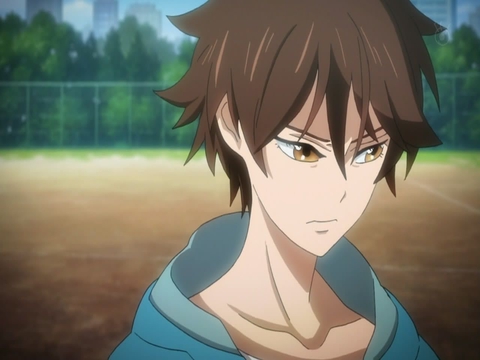
Fuck noitaminA and their 1-Cour Format.
This week’s episodes help to better focus the roles of the main characters in the overall story, as well as their impact on the world around them. More importantly, these episodes directly address the situation of the Financial District itself. Midas Bank gives Entrés some Midas Money equivalent to that of their future. However, the term “future” is very vague, and literally everyone in this series thinks that such a business concept is strange. After all, how can one quantify possibility itself? It seems that this term also includes the lives of everyone an Entré interacts with and even creates (i.e. offspring). Furthermore, the more wealthy the Entré is, the greater the influence they have on reality, regardless of how little Midas Money they lose in a Deal.
Such revelations have generated opposing views concerning the Financial District. Sato thinks that there cannot and should not be coexistence with the District, and Kou is inclined to agree, while Mikuni sees the District as a necessary evil. The most important detail this week is the emphasis both Mikuni and Kou place on children, the universal symbol for growth and continuation. The major difference is that Mikuni wants to create a place for children to live, but Kou wants to create a place for children to GROW. It will be very interesting to see how these views clash and if there can be any sort of positive resolution.
The Borrower Arrietty
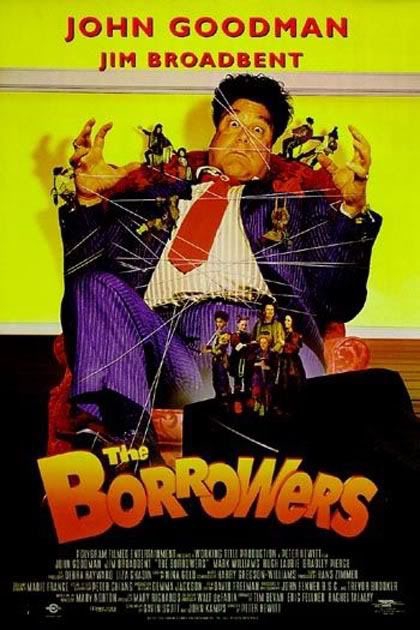
No not that one, but this movie would be a lot more entertaining with John Goodman.
Produced by Studio Ghibli, this film depicts the life of a family of little people that call themselves Borrowers. A young boy named Sho goes to live with his grandmother in the woods. Due to his weak heart, he can’t do much but rest in his bed or lay in the field of flowers adjacent to the house. One day, he catches a glimpse of a young girl the size of a leaf named Arrietty. The basic plot of the movie is that Borrowers (who already have a sparse population) get ever fewer in number due to animals, environment, and MAN. As such, Borrowers operate in secret. During Arrietty’s first Borrowing (where they basically take stuff to support their subsistence lifestyle) with her father, Sho sees her again.
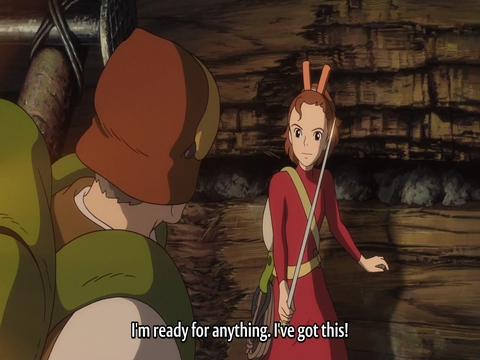
I am the Bone of my Pin.
Arrietty’s parents are deathly afraid of humans, having heard the tales of human cruelty towards…well everything. As such, the parents decide that they must move, which is really unfortunate because they have a gorgeous home. Sho, who repeatedly tries to become friends with the Borrowers is likewise shunned for fear of some human treachery. Now, it turns out that Sho’s grandmother (and her parents) have suspected for a long time that Borrowers were living in the house, and her father even had a spectacular dollhouse professionally made for them to live in. Unfortunately, the Borrowers never used the house because, again, mistrust. The day before the Borrowers decide to leave, Sho finds their home, takes out their entire kitchen, and replaces it with the kitchen section from the dollhouse…all in front of the Arriety’s mother.
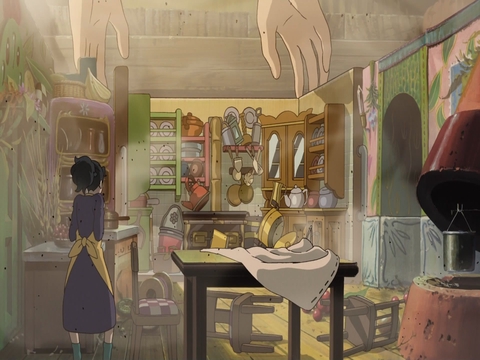
Extreme Makeover - Borrowers Edition
The grandmother also has an old maid named Haru, and it turns out that she’s a total trololol.
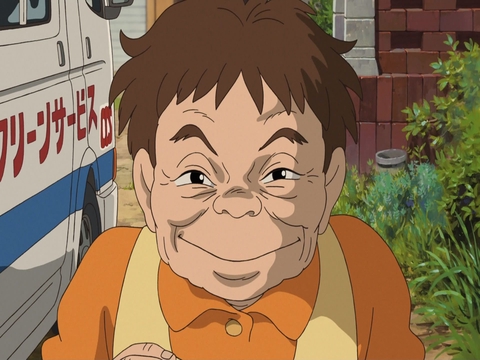
DEEERRRRP.
She notices things around the house that would indicate the existence of little people, and so she basically spends most of the movie stomping about and staring at things. She finally uncovers the Borrowers’ house, takes the mother, and puts her in a jar in the pantry. Just to make sure she fills her bitch quota, she locks Sho in his room on the second floor and calls the exterminators.
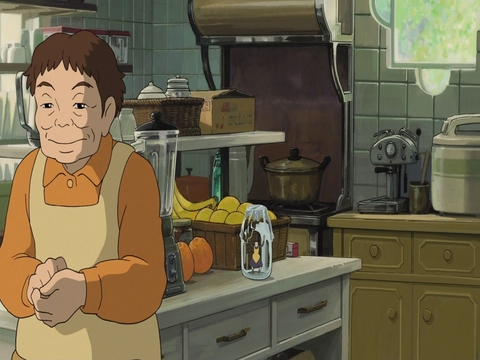
Awww, I forgot to put holes in the jar.
Arrietty discovers her mother’s kidnapping and goes to Sho for help. Together, they both free her mother and get everyone to safety. Meanwhile, Haru goes to triumphantly tell Haru’s grandmother about the discovery, but all her proof has been taken by Sho.
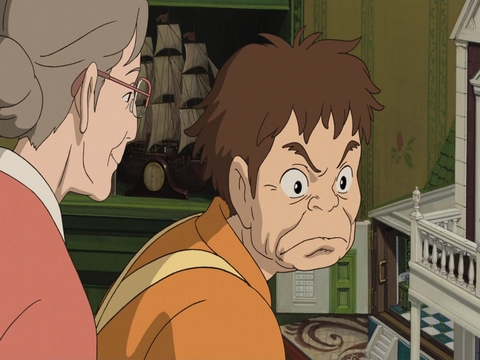
Problem, Haru?
Sho ends up telling his grandmother about the Borrowers anyway, which delights the grandmother. Unfortunately, the Borrowers have already left in search of a new place to go. Arrietty has one last goodbye scene with Sho, and then she’s on her way.
I personally didn’t find this movie very entertaining at all. I could see why maybe a child would enjoy it, since the story is about a simple as you can imagine, and the animation is pretty good (although the background scenery switches a lot from detailed animation to cartoon artifacting during panoramic shots). The most annoying part is the characters, not Sho and Arrietty, I mean practically everyone else. Arrietty’s parents don’t hate all humans, but they wouldn’t touch humans with a 10-foot pole. Haru is pretty much just a total bitch for the entire movie, and there’s literally no reason for it. She doesn’t hate the Borrowers, and absolutely NOTHING else is revealed about her. I haven’t seen such pure one-dimensionality in a character since the Precure Movie. And those animals. The way they acted around Arrietty, you’d think they were demon-possessed. Actually, the only characters that weren’t as static as the background scenery were Arrietty and the cat.
The biggest offense this movie brings is how downright forced the story is. Every single character in this story is nice, and the only things that move it along are bigotry on both sides and Haru’s fanatical trolling. That said, the grandmother could have just reprimanded/fired Haru and the Borrowers could coexist with the humans in the dollhouse. Instead, the movie forces a sub-par ending, just because the parents still don’t trust humans. Even the hunter character Spiller feels tossed in just to clarify a couple small plot points and to act as a possible love interest…all within 60 seconds.
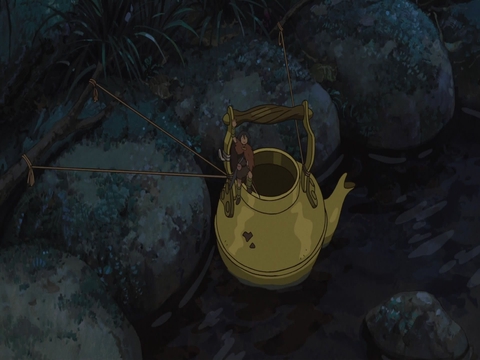
Spiller: because it sounds better than Crackpot.
I won’t call this movie a waste of my time, but there are A LOT of better things to watch in that time.
Tune in next week for more [C], Movie Roulette, and whether the club survives Spring Allocation: The Re-Budgetting.
Gene · October 8, 2011 at 11:12 pm